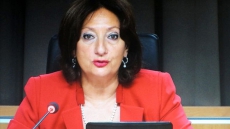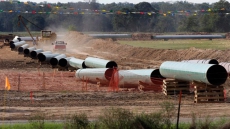OTTAWA — Stephen Harper used to contend that money does not influence the outcome of elections.
He used to rail against any attempt to limit the amount of money outside advocacy groups could spend during campaigns.
And he used to strenuously object to any attempts to compel those groups to disclose from whom they got their money or how they spent it.
That was, of course, before he became prime minister.
Now, Harper heads a party that accuses labour unions of trying to "bully and influence our elections from the outside" and routinely uses the spectre of dastardly union politicking to drum up donations the Conservatives say are urgently needed to ensure victory in next year's election.
And he heads a government bent on forcing unions to disclose the salaries of their employees and just how they spend the money they collect from members' dues.
Former Liberal cabienet minister Don Boudria stops just short of calling it hypocrisy.
"I think this is a case of that was then and this is now," says Boudria, who was named in a court challenge launched by private citizen Stephen Harper in 2000 against the then-Liberal government's so-called "gag law" limiting spending by outside third parties during election campaigns.
"The ironies are all over the place."
And there's one more irony: since taking power in 2006, Harper has not lifted a finger to repeal the gag law he once fought all the way to the Supreme Court.
"There's been a lot of things that have disappointed me and disillusioned me about Stephen Harper as prime minister and that's one of the big ones for me," says Gerry Nicholls, Harper's former sidekick at the National Citizens Coalition.
As president of the NCC, Harper saw the gag law as an unconstitutional attempt by Liberals to silence conservative advocacy groups.
"The obvious intent of the gag law is to stifle independent voices at election time. The government wants to shut out and shut up groups like the NCC," Harper declared the day he launched the court challenge.
After two lower court victories, Harper eventually lost the legal battle in the Supreme Court. But when he was running to become leader of the Conservative party in 2004, he signed a pledge to repeal the gag law should he ever become prime minister.
Nine years in power later, three of them at the helm of a majority, and the gag law seems confined to the dustbins of Harper's mind. Third parties are still prohibited from spending more than a total of $150,000 on advertising during a general election, including no more than $3,000 in any single riding. They must also report details of their advertising expenses to Elections Canada and disclose the donors whose money made the ads possible.
"What philosophically has changed between Stephen Harper in 2014 and Stephen Harper in 2000, when we were going after these laws? I'd really like to know," says Nicholls.
Nicholls surmises Harper's retreat may be a function of the fact that it would be a hard sell politically to scrap or loosen restrictions on spending during elections. People tend to favour the notion of getting filthy lucre out of the business of politics, notwithstanding the libertarian argument that Harper and the NCC used to make about the free marketplace of ideas and how no amount of money could ever convince people to vote for a bad idea.
More significantly, Nicholls believes Harper has discovered it's in his political self-interest to stifle his own ideological opponents.
"People are all in favour of free speech as long as they agree with the speech. All too often, if they don't like the groups which are speaking out then suddenly, 'Yeah, we've got to pass a law to stop them.'"
It's no secret the Harper regime doesn't like unions, a number of which have vowed all-out warfare to bring down the Tories.
Although unions are already prohibited from donating to political parties or candidates and are severely restricted, as third parties, in what they can spend on advertising during campaigns, it seems Harper wants to ratchet the restrictions up a notch.
A backbench Conservative MP's private member's bill, strongly backed by the Prime Minister's Office, would force unions to publicly disclose the names and salaries of all employees earning more than $100,000 and to reveal how much of their time each of those employees spends on political activities, lobbying and other non-labour relations activities.
Conservatives are clearly banking on such transparency angering dues-paying members and shaming union bosses into curtailing outlays for political activity.
"The union bosses are against it because they don't want people, including their own members, to know how they spend their money," Conservative Senator Bob Runciman, who is sponsoring the bill in the Senate, told the upper house last September.
Runciman used the recent Ontario provincial election to make his case for the bill, which has been widely denounced as shoddily drafted, unconstitutional and an invasion of privacy. He complained bitterly that unions spent some $10 million to re-elect the Liberals — "more than any of the three major parties is allowed to spend" in the province, which does not restrict third party spending.
But there's an obvious application to the looming federal election as well.
As the Conservative party warned in a recent fundraising email: "Sid Ryan (head of the Ontario Federation of Labour) and people like him want to bully and influence our elections from the outside, unaccountably spending all kinds of money to hurt us — without ever running for office.
"We won't let that happen. We're going to take them on and we're going to win."
Maybe so. But given the severe restrictions on union campaign spending compared to the $20-plus-million the Conservative party is entitled to spend, Nicholls says it will hardly be a fair fight. And the old Stephen Harper would have agreed with him.





